| Listing 1 - 9 of 9 |
Sort by
|
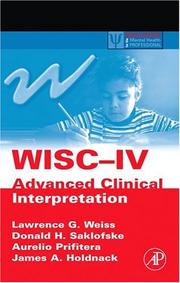
ISBN: 1280707569 9786610707560 0080466117 0120887630 1493300040 9780120887637 9780080466118 9781280707568 Year: 2006 Publisher: Burlington, MA Academic Press/Elsevier
Abstract | Keywords | Export | Availability | Bookmark
 Loading...
Loading...Choose an application
- Reference Manager
- EndNote
- RefWorks (Direct export to RefWorks)
For both experienced psychologists and graduate students, this book moves quickly through the essentials of WISC-IV interpretation and onto an insightful analysis of the major cognitive domains assessed by WISC-IV. It is the intention of the editors to raise the standard of practice from a simplistic 'test-label-place' model to a clinical model of assessing to understand and intervene. In the first chapter, the reader is presented with a comprehensive array of societal and home environment factors for which there is empirical evidence indicating their impact on the development of children's co
Wechsler Intelligence Scale for Children. --- WISC (Intelligence test) --- Children --- Intelligence testing
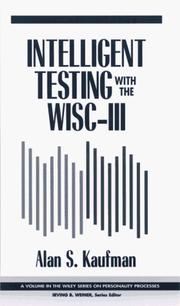
ISBN: 0471578452 Year: 1994 Publisher: New York (N.Y.) Wiley
Abstract | Keywords | Export | Availability | Bookmark
 Loading...
Loading...Choose an application
- Reference Manager
- EndNote
- RefWorks (Direct export to RefWorks)
Wechsler Intelligence Scale for Children --- #KVHB:WISC-III NL --- #KVHB:Test; intelligentie --- WISC (Intelligence test) --- Children --- Intelligence testing --- Wechsler Intelligence Scale for Children. --- Psychodiagnostiek --- intelligentieonderzoek --- intelligentieonderzoek. --- Intelligentieonderzoek.
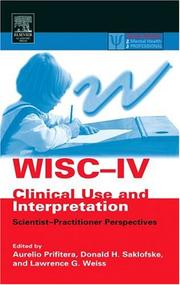
ISBN: 0125649312 9786610927012 1280927011 0080521738 9780125649315 9780080521732 9781280927010 6610927014 Year: 2005 Publisher: Amsterdam Boston Elsevier Academic Press
Abstract | Keywords | Export | Availability | Bookmark
 Loading...
Loading...Choose an application
- Reference Manager
- EndNote
- RefWorks (Direct export to RefWorks)
WISC-IV Clinical Use and Interpretation provides comprehensive information on using and interpreting the WISC-IV for clinical assessment and diagnosis. With chapters authored by recognized experts in intelligence research, test development, and assessment, this will be a valuable resource to anyone using the WISC-IV in practice. This information is available nowhere else and is a unique opportunity to understand the WISC-IV from the perspective of those who know it best. Most relevant to practitioners is the applied focus and interpretation of the WISC-IV in psychological and psychoeducation
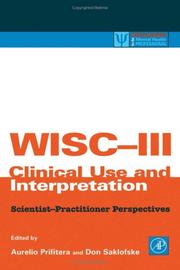
ISBN: 9780125649308 0125649304 9780080521206 0080521207 9786610927364 1280927364 Year: 1998 Publisher: San Diego, Calif. : Academic Press,
Abstract | Keywords | Export | Availability | Bookmark
 Loading...
Loading...Choose an application
- Reference Manager
- EndNote
- RefWorks (Direct export to RefWorks)
The WISC-III is the most frequently used IQ assessment technique in the United States. This book discusses the clinical use of the WISC-III with respect to specific clinical populations, and covers research findings on the validity and reliability of the test. It also includes standardization data from the Psychological Corporation. Many of the contributors participated in the development of the WISC-III and are in a unique position to discuss the clinical uses of this measure. The book describes the WISC-III from scientist-practitioner perspectives. It provides methods to aid in understan
Wechsler Intelligence Scale for Children. --- Intelligence tests --- Intelligence levels --- Intelligence testing --- IQ tests --- Mental tests --- Psychological tests --- WISC (Intelligence test) --- Children --- Testing
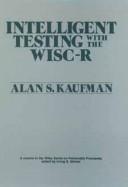
ISBN: 0471049719 Year: 1979 Publisher: New York (N.Y.) Wiley
Abstract | Keywords | Export | Availability | Bookmark
 Loading...
Loading...Choose an application
- Reference Manager
- EndNote
- RefWorks (Direct export to RefWorks)
159.9.072 --- Wechsler Intelligence Scale for Children --- WISC (Intelligence test) --- Children --- Experimentele psychologie. Testen en onderzoeken in de psychologie --- Intelligence testing --- Wechsler Intelligence Scale for Children. --- 159.9.072 Experimentele psychologie. Testen en onderzoeken in de psychologie
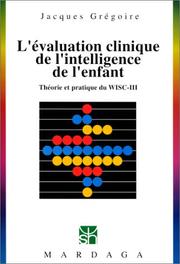
ISBN: 2870097190 9782870097199 Year: 2000 Volume: 229 Publisher: Sprimont : Mardaga,
Abstract | Keywords | Export | Availability | Bookmark
 Loading...
Loading...Choose an application
- Reference Manager
- EndNote
- RefWorks (Direct export to RefWorks)
L'Echelle de Wechsler pour Enfants est sans doute le test d'intelligence le plus utilisé dans le monde. Sa version la plus récente, le WISC-III, a été récemment adaptée en langue française. Pourtant, malgré son évident succès, cet instrument reste mal connu des praticiens tant du point de vue de ses fondements théoriques que des principes méthodologiques qui devraient guider son utilisation clinique. Le présent ouvrage vise à combler ces lacunes et à offrir aux psychologues un cadre de référence qui leur permette de tirer du WISC-III un maximum d'informations valides et utiles pour le diagnostic et la prise de décision. Dans un premier chapitre, les principes théoriques sur lesquels Wechsler a construit ses échelles sont rappelés et leurs implications sont discutées. Dans le chapitre suivant, les échelles de Wechsler sont confrontées à divers modèles de l'intelligence (modèles factoriels, modèle piagétien et modèles cognitivistes). Cette confrontation met en évidence l'actualité de ces échelles et éclaire les processus mentaux qui y sont mis en jeu. La question des différences intergroupes et des biais socioculturels au WISC-III est abordée dans Lin troisième chapitre. Le quatrième chapitre est consacré à l'analyse approfondie des propriétés métriques du WISC-III. Sur base de ces propriétés, une méthode d'interprétation rigoureuse des protocoles est développée dans les chapitres cinq et six. Elle s'appuie sur une large revue de la littérature et sur une analyse approfondie des résultats de l'échantillon d'étalonnage français. Cette méthode d'interprétation, qui a la forme d'un arbre de décision, part des informations les plus globales et progresse systématiquement vers les informations les plus spécifiques. Rigoureuse d'un point de vue psychométrique et étayée par les connaissances théoriques les plus récentes, cette méthode devrait permettre aux praticiens de faire un usage intelligent du WISC-III.
Wechsler Intelligence Scale for Children --- Wechsler Intelligence Scale for Children. --- Intelligence tests. --- Children --- Wechsler, Echelle d'intelligence pour enfants de --- Intelligence --- Enfants --- Intelligence testing. --- Tests --- Tests d'intelligence --- #KVHB:Intelligentietests --- #KVHB:Psychodiagnostiek --- #KVHB:WISC --- WISC (Intelligence test) --- Intelligence testing
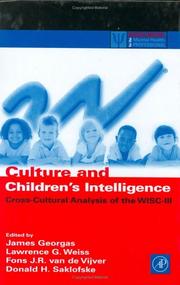
ISBN: 1417562099 9781417562091 1592784763 9781592784769 0080488617 9780080488615 9786610927043 6610927049 0122800559 9780122800559 1280927046 Year: 2003 Publisher: Amsterdam Academic Press
Abstract | Keywords | Export | Availability | Bookmark
 Loading...
Loading...Choose an application
- Reference Manager
- EndNote
- RefWorks (Direct export to RefWorks)
This book provides a unique cross-cultural perspective of the WISC-III. From construction, translation and adaptation in different cultures, to analysis of its structure and function as a concept, to its clinical use with different ethnic groups, Culture and Children's Intelligence provides clinician's the tools they need when using the WISC-III. The focus of this reference work is on children's intelligence as measured by the WISC-III in different cultures and its use in these cultures (USA, UK, Canada, France, Belgium, Germany, Austria, Switzerland, Sweden, and Greece). It also discu
Sociology of culture --- Intelligentie --- Psychologie --- Pedagogiek --- Cultuur --- Gedragstherapie --- Wechsler Intelligence Scale for Children --- #PBIB:2003.4 --- #KVHB:Cross-culturele psychologie --- #KVHB:Intelligentietests --- #KVHB:WISC-III NL --- WISC (Intelligence test) --- Children --- Intelligence testing --- Intelligence testing.
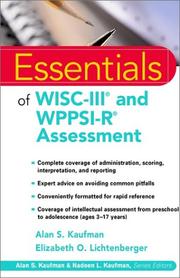
ISBN: 0471345016 Year: 2000 Publisher: New York Toronto : John Wiley,
Abstract | Keywords | Export | Availability | Bookmark
 Loading...
Loading...Choose an application
- Reference Manager
- EndNote
- RefWorks (Direct export to RefWorks)
Wechsler Intelligence Scale for Children --- Wechsler Preschool and Primary Scale of Intelligence --- Wechsler, Echelle d'intelligence pour enfants de --- Wechsler, Echelle d'intelligence pour la période préscolaire et primaire de --- #KVHB:WISC-III NL --- #KVHB:WPPSI-R --- #KVHB:Psychodiagnostiek --- Wechsler, Echelle d'intelligence pour la période préscolaire et primaire de --- WPPSI (Intelligence test) --- WISC (Intelligence test) --- Children --- Intelligence testing --- Enfant --- Mesure --- Intelligence --- mesure
Book
ISBN: 0128157453 0128157445 9780128157442 Year: 2019 Publisher: London, England : Academic Press,
Abstract | Keywords | Export | Availability | Bookmark
 Loading...
Loading...Choose an application
- Reference Manager
- EndNote
- RefWorks (Direct export to RefWorks)
WISC-V: Clinical Use and Interpretation, Second Edition provides practical information for clinicians on the selection of subtest measures, along with their proper administration and interpretation. Full Scale IQ is identified as important for predicting relevant behaviors and primary index scores for characterizing the child’s strengths and weaknesses. Classroom indicators of low scores on each of these abilities are identified, with suggested interventions, accommodations and instructional strategies for low scorers. Coverage includes ethnic differences for the Full Scale IQ and each primary index score, along with evidence of the profound influence of parental attitudes and expectations. Several other societal and contextual factors relevant to understanding racial/ethnic differences are presented. Two chapters review use of the WISC-V for identifying learning disabilities, testing of individuals with dyslexia, and best-practice recommendations to ensure accurate diagnosis and intervention. Concluding chapters describe advances in the Q-interactive system platform allowing administration of the WISC-V on iPads and other tablets, and how clinicians can tailor assessment using select WISC-V subtests and features
Wechsler Intelligence Scale for Children. --- Intelligence tests. --- Children --- Intelligence Tests. --- Child. --- Adolescent. --- WISC (Intelligence test) --- Adolescents --- Adolescents, Female --- Adolescents, Male --- Teenagers --- Teens --- Adolescence --- Youth --- Adolescent, Female --- Adolescent, Male --- Female Adolescent --- Female Adolescents --- Male Adolescent --- Male Adolescents --- Teen --- Teenager --- Youths --- Minors --- Mental Tests --- Intelligence Test --- Mental Test --- Test, Intelligence --- Test, Mental --- Tests, Intelligence --- Tests, Mental --- Intelligence tests for children --- Intelligence tests --- Psychological tests for children --- Intelligence levels --- Intelligence testing --- IQ tests --- Mental tests --- Psychological tests --- Intelligence testing. --- Testing --- Raven Test --- Raven's Progressive Matrices --- Raven Progressive Matrices --- Ravens Progressive Matrices --- Test, Raven
| Listing 1 - 9 of 9 |
Sort by
|

 Search
Search Feedback
Feedback About UniCat
About UniCat  Help
Help News
News